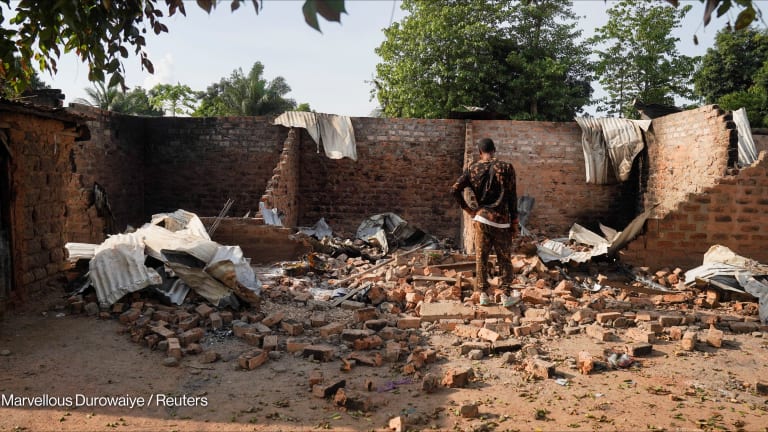
Thirteen years after the U.N. Security Council adopted its first resolution on women, peace and security, awareness on women empowerment and gender has increased considerably.
But much work remains to be done, according to Mari Skåre, the NATO secretary-general’s special representative for women, peace and security.
“There’s still a long way to go before women will have fully assumed their rightful place in matters of peace and security,” Skåre said in an exclusive interview with Devex in Brussels. She added that while the primary responsibility for ensuring implementation of gender equality resolutions rests with nations, NATO has significant contributions to make, especially through gender advisers in fragile and conflict-affected states.
Here are a few excerpts of our conversation with Skåre:
How has the issue of women’s empowerment in unstable and conflict-affected states changed since the adoption of U.N. Security Council Resolution 1325 and the entry into force of NATO’s Overarching Policy?
The adoption of the resolution in 2000 represented a significant political shift, addressing women’s experiences and roles in conflict and peacemaking as a matter of international peace and security.
[The resolution] has later been supported by other resolutions, [which] have proven to be an important tool to promote gender equality. Today, we have a much higher awareness of the need to protect those who are most vulnerable in conflicts and to enhance the participation of women in building peace and security. However … there’s still a long way to go before women will have fully assumed their rightful place in matters of peace and security.
The primary responsibility for ensuring implementation of these resolutions rests with nations, but NATO — as a regional military alliance and a security policy organization — has significant contributions to make. This is why we, together with [our] partners, developed a policy on women, peace and security in 2007 and later an action plan for NATO-led operations and have progressed with the agenda ever since.
Issues concerning women, peace and security are now firmly on our agenda and we’re working hard to mainstream a gender perspective into our everyday business and not having gender as a separate standing issue — as an afterthought, or add-on.
And how is NATO doing this?
It requires a systematic approach and will take time. Step by step, we’re integrating a gender perspective in operational planning and execution, exercises, training, defense planning and human resource policies, as well as into our dialogues and collaboration with partners. It’s only when gender becomes an integral part of our thinking that the way of doing business will change.
What progress has been made to ensure that women are consulted and included in peace processes and stabilization efforts? What effects has this had?
Last year’s report on women, peace and security from the United Nations secretary-general points to the fact that in 2011 there were 14 U.N. co-led peace processes. Of these peace processes, only four negotiating party delegations included female delegates. I agree with the secretary-general that progress in this area is much too slow.
NATO is not directly involved in peace processes. Within our responsibilities and mandates we do, however, seek to engage women and facilitate their participation also in peace and stabilization. Without women included in peace and stabilization efforts, these processes lack legitimacy, as they lack the perspectives of women affected by the conflict. Exclusion of women undermines the chances of achieving sustainable peace.
What is being done to ensure an end to the disproportionate impact that war and conflicts have on women and children?
We’re working to ensure a gender perspective in NATO-led operations through our planning instruments, through training and through deploying gender advisers. We’re reaching out to women, trying to understand their needs and interest. And we’re training and advising local forces on gender.
However, to achieve real impacts and improve the lives of women and girls in conflict-ridden areas, crisis management operations like the ones NATO is leading need to be backed by political will from nations and long-term support from the international society.
What has been your biggest achievement in your first year as Special Representative for Women, Peace and Security and what is your outlook for the coming year?
NATO is progressing integrating a gender perspective into important processes, such as operational planning and execution and we’re also seeing a much stronger focus on women, peace and security in the cooperation with partners.
The achievements made are not mine, but those of the Alliance. I hope that I’ve been able to provide focus and drive and influence how NATO is conducting its business. There’s only one way forward, if we are to meet the security challenges of this century: We need to understand gender and we need to include women more!
What is the role played by the gender advisers to help boost gender considerations in all aspects of the force’s work?
The gender advisers, both at strategic headquarters and in the field, are key personnel for planning and thus for the execution of the operations. Their role is to advise commanders on gender issues. They’re part of the planning groups and have direct access to the commanders.
We also offer training of gender advisers through the Nordic Center of Gender in Military Operations in Sweden.
How are you cooperating with other international organizations and civil society on the issues of women, peace and security?
NATO conducts staff-to-staff talks with a number of international organizations. The topic of women, peace and security is included in most of these dialogues. Of particular importance is our collaboration with the United Nations, where we also seek to develop a more practical cooperation on training. At the strategic level, we have a close exchange.
Generally speaking, civil society has been instrumental in promoting women’s rights and gender equality worldwide. And to a large degree, thanks to civil society, the U.N. resolution saw the light of day. Civil society plays an important role with its opinion leaders, and also in keeping public institutions accountable. I enjoy very much the dialogue I have with NGOs and other actors in civil society, be it with researchers, parliamentarians, watchdogs or development cooperation representatives.
What are the major lessons learned from this cooperation?
The women, peace and security agenda is very complex — with different roles and responsibilities for the various actors. The key takeaway for me is that we have much to learn from each other and that we need to cooperate both at the strategic level and in the field, in order to ensure sustained results.
Eva Donelli contributed reporting
Search for articles
Most Read
- 1
- 2
- 3
- 4
- 5








